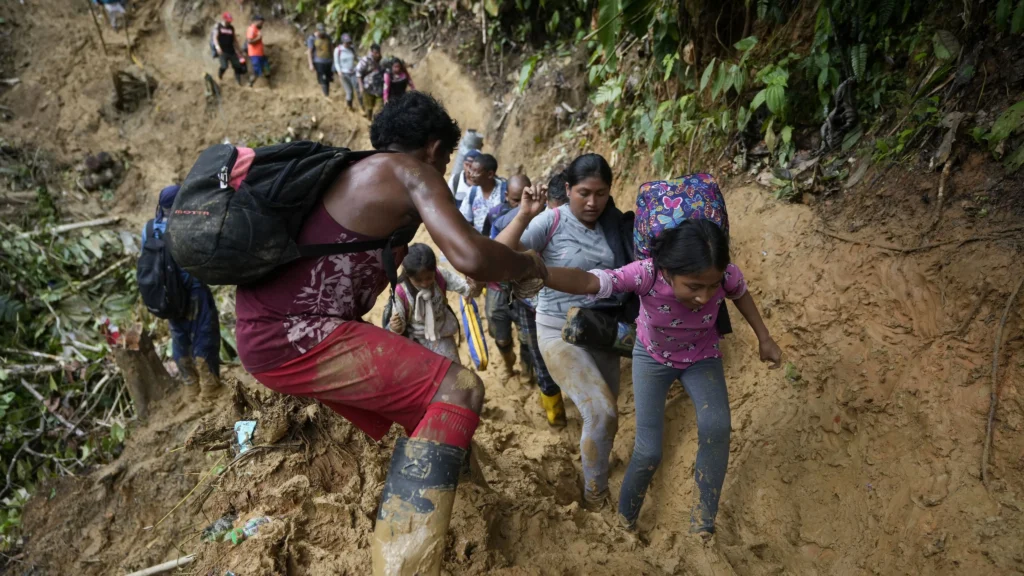Gov. Kathy Hochul’s administration is considering cutting back on how much the state will spend on the migrant crisis going forward, arguing the “unsustainable” situation could negatively impact other areas of the state budget.
New York City’s struggle to house, feed and offer other services like legal assistance ranks at the top of the state’s “most pressing” burdens, according to an Oct. 28 memo penned by Hochul’s Division of the Budget Director Blake Washington.
“[W]e must consider limiting our assistance to targeted interventions such as legal services, case management and efforts to connect migrants and asylum seekers to jobs, as opposed to sharing in more costly services such as indefinite stays in hotel rooms,” Washington wrote to Karen Persichilli Keogh, secretary to the governor, in the two-page document obtained by NY1.
He said although the state will keep up commitments made to Mayor Eric Adams’ administration laid out in last year’s $229 billion state budget — like reimbursing City Hall for 30% of migrant housing costs and funding tied to mega-migrant sites called Humanization Emergency Response and Relief Centers — they need to reign in spending.
“New York’s ability to pay for these programs is not unlimited. As you know, the governor has publicly stated we are committed to balancing a budget without raising taxes or relying on one-time reserves to fund recurring obligations,” he continued.
“This will require revisions to projected spending growth for existing programs which will make our ability to provide assistance to asylum seekers and migrants unsustainable.”
He noted that without relief in the form of federal dollars or big change in immigration policy, “New York State can only shoulder this financial commitment for a limited duration without putting other areas of the State budget at risk, such as aid to public schools, support for our health delivery infrastructure, and the readiness of our National Guard.”
Washington’s warning preceded the DOB’s Monday release of its mid-year assessment of the Empire State’s financial picture.
The DOB reported the state will spend nearly $2 billion on the migrant crisis by next April – adding $358 million in spending on top of the crisis’ current $1.5 billion tab.
That includes footing the bill for expenses tied to a 12-month lease on the federally owned, Brooklyn-based Floyd Bennett Field, which is slated to become the next large-scale migrant shelter.
Meanwhile, New York faces additional “headwinds, such as lower than anticipated tax receipts thanks to a weakened economy.”
However, the DOB was able to decrease out-year budget gaps through 2027, thanks to belt-tightening measures related to overall operational spending.
Previous estimates from the DOB projected spending to increase to roughly $9 billion in fiscal year 2024-2025, but according to the authority’s new estimates, that gap was cut nearly in half, to $4.3 billion. Between 2025-2026, the number decreased from a jaw-dropping $13 billion to $9.5 billion and then further drops to $7.7 billion in 2026-2027, down from a projected $13 billion.
Independent fiscal hawks cheered the effort, but cautioned that Hochul and the legislature still need to focus on plugging the looming $4.3 billion hole over the next several months.
“What the DOB is doing here is both conservative in budgeting and appropriately cautious to not overestimate what tax receipts are going to be,” said Patrick Orecki, director of state studies at the fiscally conservative Citizens Budget Commission.
“But there are still multi-billion dollar budget gaps to close. Spending is still growing faster than what the state is taking in over long-term going forward.”
Speaking on Monday, Hochul said the decision was “a warning that we cannot continue to be paying for unlimited hotel rooms for people.”
“We’re approaching $2 billion already this year. So that’s $1 billion more than we anticipated,” the governor said. “I’m just sending out the alert as our budget that that rate is unsustainable. We need changes.”
City Hall will soon release its own reassessment of city finances, but previously Adams said the migrant crisis will cost the Big Apple $12 billion over the next three years.
Nearly 120,000 individuals have arrived in the five boroughs since the spring of 2022 and the Adams administration is currently housing around 65,000 families with children and single adults in taxpayer-funded shelters.
Adams is fighting in court against a decades-old, “right to shelter” mandate that means the city must provide a bed to any individual who requests assistance. He argues the mandate is dated, and did not account for the unprecedented amount of homeless migrants that arrived in the city over the last year and a half.
Meanwhile, his administration also greenlit a policy that limited how long migrants can stay in city-run shelters, before they have to reapply for bed placement.
Hochul is worried about lower-than-expected tax receipts amidst the ongoing threat of a possible recession, but she doesn’t want to raise taxes or dip into savings.
Additional financial help from President Joe Biden can’t be counted on, and the Republican-controlled Congress is unlikely to come to the rescue.
“I don’t see more money being thrown at this,” Rep. Michael Lawler said. “The reality is that under Joe Biden’s presidency, over 6 million migrants have crossed over our southern border. That’s totally unsustainable.”
Source: Spectrum News


